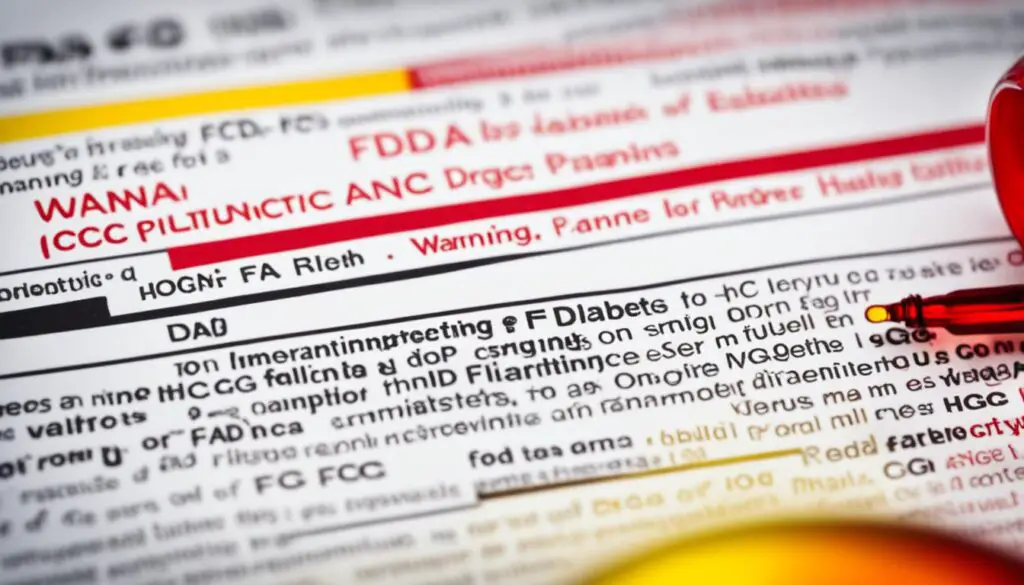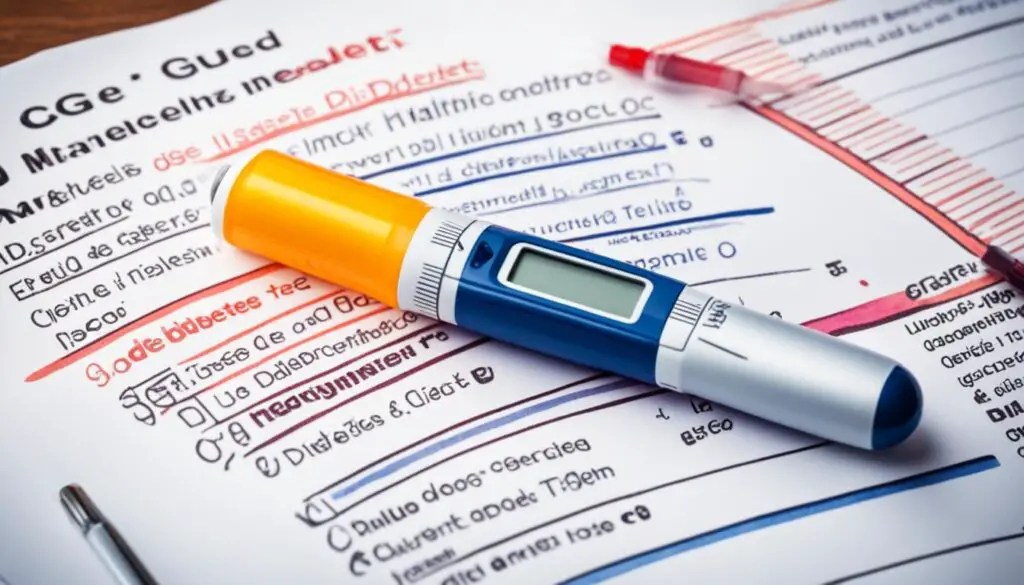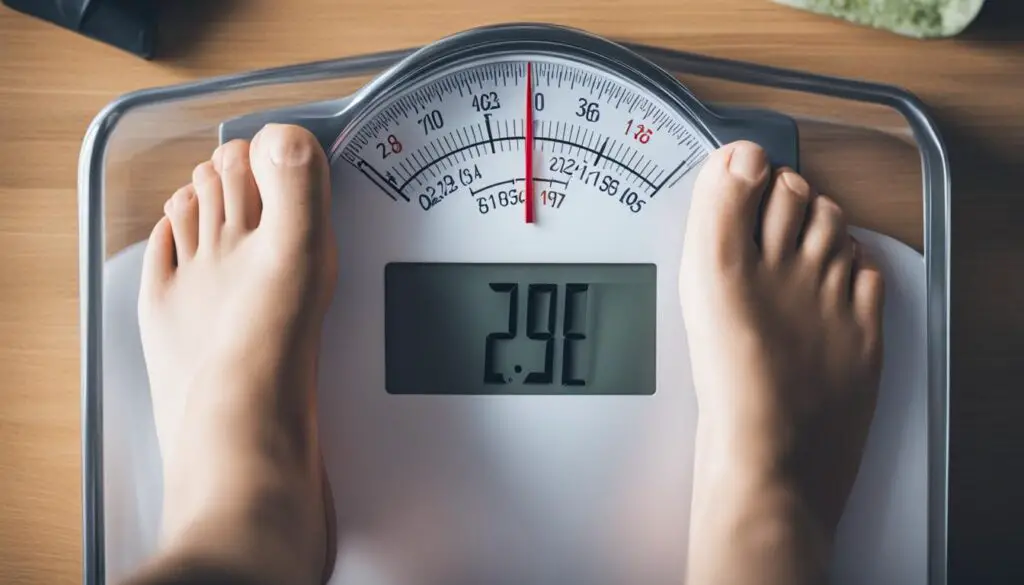Did you know that the use of HCG drops for weight loss in individuals with diabetes has raised serious concerns about safety and potential risks? The U.S. Food and Drug Administration (FDA) has stated that HCG is not approved for over-the-counter use or for weight loss purposes. Even though some over-the-counter HCG weight-loss products are labeled as “homeopathic,” the FDA has clarified that they are still not safe.
The severe calorie restriction that is a key component of the HCG diet can lead to risks such as gallstone formation, irregular heartbeat, and nutrient deficiencies. Moreover, HCG might encourage the production of androgen cells, potentially increasing the risk of certain types of cancers. Considering these risks, it is crucial for individuals with diabetes to explore safer and more sustainable methods of weight loss in consultation with their healthcare provider.
Key Takeaways:
- HCG drops for weight loss in individuals with diabetes are not considered safe by the FDA.
- The severe calorie restriction in the HCG diet can lead to various risks and nutrient deficiencies.
- HCG may encourage the production of androgen cells, potentially increasing the risk of certain types of cancers.
- Individuals with diabetes should explore safer and more sustainable weight loss methods in consultation with their healthcare provider.
- A balanced diet and regular exercise can support safe and effective weight loss for individuals with diabetes.
Understanding the HCG Diet and its Claims
The HCG diet is a weight loss strategy that combines the use of hormone supplements or injections with a severely restrictive calorie intake. Advocates of the HCG diet claim that the HCG hormone can reduce hunger and promote weight loss by redistributing body fat. However, it is essential to approach these claims with caution, as there is no scientific evidence to support them.
The FDA has stated that HCG supplements are not considered safe for weight loss and has issued warnings against their use. Moreover, the effectiveness of the HCG hormone in promoting weight loss has not been proven, and its use may be unsafe, particularly in certain dosages.
When considering weight loss strategies, it is crucial to rely on evidence-based methods and consult healthcare professionals. They can provide guidance tailored to your specific needs and help you choose safe and effective approaches to weight loss.
Why the HCG Diet Fails to Deliver
The HCG diet’s effectiveness is highly questionable due to several factors:
- Lack of scientific evidence supporting the claims of the HCG hormone in promoting weight loss.
- Potential safety concerns associated with using HCG hormone supplements or injections.
- Unsustainable and severely restrictive calorie intake, typically around 500 to 800 calories per day.
Considering these factors, it becomes clear that the HCG diet may not deliver the desired results and may even pose risks to your health.
The FDA’s Position on the HCG Diet
The FDA does not consider HCG supplements safe for weight loss and has warned against their use.
The FDA has stated that there is no substantial evidence to support the claim that HCG increases weight loss beyond that resulting from caloric restriction alone. The use of HCG for weight loss is considered an “off-label” use, meaning it is not an approved use of the hormone. Selling HCG weight-loss products without a prescription is illegal, and the FDA has taken action against companies marketing these products.
The Importance of Prioritizing Safety
Your health and well-being should always be the top priority when considering weight loss strategies. Choosing evidence-based methods, working with healthcare professionals, and ensuring a balanced and sustainable approach can help you achieve your weight loss goals safely.
Exploring Safer Alternatives
Instead of relying on the HCG diet, it is advisable to explore safer and more sustainable weight loss alternatives. These may include maintaining a balanced diet, engaging in regular physical activity, and seeking professional guidance from healthcare providers or registered dietitians.
A Comparison of the HCG Diet and Safe Weight Loss Strategies
| HCG Diet | Safe Weight Loss Strategies | |
|---|---|---|
| Scientific Evidence | No substantial evidence supporting claims | Backed by scientific research and studies |
| Safety | Potential risks and safety concerns | Focus on overall health and well-being |
| Calorie Intake | Severely restricted (500-800 calories/day) | Balanced approach with appropriate caloric intake |
| Professional Guidance | May lack medical supervision | Consultation with healthcare professionals |
| Sustainability | Unsustainable long-term | Focus on healthy habits and long-term success |
Table: Comparing the HCG Diet to safe and effective weight loss strategies.
Visual representation of a person measuring their waist circumference, highlighting the importance of adopting safe and sustainable weight loss strategies.
The FDA’s Stance on HCG Weight-Loss Products

When it comes to HCG weight-loss products, the FDA has made its position clear. These products are not approved for over-the-counter use or for weight loss purposes. In fact, the FDA has issued warnings to consumers about the dangers of using HCG for weight loss.
The FDA states that there is no substantial evidence to support the claim that HCG increases weight loss beyond what is achieved through caloric restriction alone. In other words, any weight loss experienced while using HCG is primarily due to the severe calorie restriction associated with the diet.
It’s important to note that the use of HCG for weight loss is considered “off-label,” meaning it is not an approved use of the medication. The FDA takes this matter seriously and has taken action against companies that market HCG products for weight loss without a prescription, as selling these products without proper authorization is illegal.
To summarize, the FDA does not endorse the use of HCG weight-loss products, as they have not been proven safe or effective for weight loss. Taking these products without proper medical supervision can be risky and may jeopardize your health. It’s always best to consult with healthcare professionals and explore safer alternatives for weight loss.
| Key Points |
|---|
| The FDA does not approve HCG weight-loss products for over-the-counter use or for weight loss purposes. |
| There is no substantial evidence that HCG increases weight loss beyond that resulting from caloric restriction. |
| The use of HCG for weight loss is considered “off-label” and not approved by the FDA. |
| The FDA has taken action against companies selling HCG products for weight loss without proper authorization. |
Note: The table above summarizes the key points discussed in this section.
Potential Side Effects of the HCG Diet
The HCG diet is known to have several potential side effects and risks that individuals should be aware of before considering its use. These side effects can range from mild discomfort to more serious health complications. Here are some of the possible side effects associated with the HCG diet:
- Fatigue: Some individuals may experience increased fatigue and lack of energy while following the HCG diet.
- Irritability and restlessness: The severe calorie restriction of the HCG diet can lead to mood changes and irritability.
- Depression: The extreme calorie restriction and strict rules associated with the HCG diet may contribute to feelings of depression or sadness.
- Fluid buildup (edema): The HCG hormone used in the diet can cause fluid retention, resulting in swelling in various parts of the body.
- Swelling of the breasts in males (gynecomastia): Some individuals have reported enlargement or tenderness of the breast tissue while using HCG drops.
- Risk of blood clots (thromboembolism): Severe calorie restriction can increase the risk of blood clots forming and blocking blood vessels, which can have serious health consequences.
- Potential cancer risk: Research suggests that the use of HCG weight-loss products may increase the risk of certain types of cancers due to their potential to encourage the growth of androgen cells.
It is important for individuals considering the HCG diet to be fully informed about these potential side effects and risks. Prioritizing health and safety is crucial when embarking on any weight loss journey. Consulting with a healthcare professional is recommended to fully understand the potential risks and explore safer alternatives.
Example: Potential Side Effects of the HCG Diet
| Side Effects | Description |
|---|---|
| Fatigue | Increased tiredness and lack of energy |
| Irritability and restlessness | Mood changes and restlessness |
| Depression | Feelings of sadness or low mood |
| Fluid buildup (edema) | Retention of fluid causing swelling |
| Swelling of the breasts in males (gynecomastia) | Enlargement or tenderness of breast tissue |
| Risk of blood clots (thromboembolism) | Increased risk of blood clots blocking blood vessels |
| Potential cancer risk | Increase in certain types of cancers due to the growth of androgen cells |
Why the HCG Diet May Not Work for Diabetics

The HCG diet’s severe calorie restriction may not be suitable for individuals with diabetes. Managing blood sugar levels is crucial for effective diabetes management, and low-calorie diets, like the HCG diet, can disrupt this delicate balance and lead to complications.
The HCG hormone, on which the diet is based, has not been proven to have any direct impact on diabetes management. While the HCG diet claims to promote weight loss, there is no scientific evidence to support its effectiveness in diabetes management or improving blood sugar control.
For effective weight loss and diabetes management, it is essential for individuals with diabetes to work closely with their healthcare provider. A personalized weight loss plan that addresses their specific needs and aligns with their diabetes management goals can be developed. This plan may include a balanced diet, regular exercise, and monitoring blood sugar levels.
It is important to prioritize one’s health and to explore safer and more sustainable methods of weight loss that are tailored to an individual’s unique needs and health conditions. By working closely with healthcare professionals, individuals with diabetes can achieve their weight loss goals while effectively managing their diabetes.
Key Points:
- The severe calorie restriction of the HCG diet may not be suitable for individuals with diabetes.
- The HCG hormone has not been proven to have any direct impact on diabetes management.
- Working closely with healthcare professionals is crucial for developing a personalized weight loss plan for individuals with diabetes.
- Safer and more sustainable methods of weight loss should be explored to effectively manage diabetes while achieving weight loss goals.
Safer Alternatives for Weight Loss with Diabetes
If weight loss is a goal for individuals with diabetes, there are safe and effective options that can be pursued. It is important to work closely with a healthcare provider or a registered dietitian to develop a personalized weight loss plan that takes into account diabetes management goals and individual health needs.
A balanced diet that includes whole foods, portion control, and regular physical activity is key to achieving safe and sustainable weight loss for individuals with diabetes. By focusing on nutritious meals and snacks, individuals can nourish their bodies while effectively managing blood sugar levels. Prioritizing lean proteins, complex carbohydrates, healthy fats, and plenty of fruits and vegetables can support overall health and assist in weight loss goals.
In addition to a balanced diet, regular physical activity plays a crucial role in weight management for individuals with diabetes. Engaging in at least 150 minutes of moderate-intensity aerobic exercise, such as brisk walking, cycling, or swimming, each week can help burn calories, improve cardiovascular health, and contribute to weight loss while managing diabetes effectively.
Quote: “By working hand in hand with healthcare professionals, individuals with diabetes can develop a personalized weight loss plan that ensures safe and effective results.”
Eating Habits That Promote Weight Loss for Diabetics
When it comes to managing diabetes and achieving weight loss goals, it’s essential to adopt healthy eating habits. Here are some strategies that can be incorporated into a diabetes-friendly weight loss plan:
- Practice portion control: Pay attention to serving sizes and aim for balanced meals that include appropriate portions of carbohydrates, proteins, and fats.
- Eat whole foods: Choose whole grains, lean proteins, healthy fats, and a variety of fruits and vegetables to provide essential nutrients and fiber.
- Avoid sugary beverages: Opt for water, herbal tea, or unsweetened drinks instead of sugary sodas or fruit juices that can spike blood sugar levels.
- Mindful eating: Slow down during meals, savor each bite, and pay attention to hunger and fullness cues to avoid overeating.
- Stress management: Be mindful of emotional eating triggers and develop strategies to cope with stress that don’t involve food.
Sample Meal Plan for Diabetes-Friendly Weight Loss
Here is a sample meal plan that demonstrates how a day of balanced eating can support weight loss and diabetes management:
| Meal | Menu |
|---|---|
| Breakfast | Spinach and mushroom omelet with whole-wheat toast 1 small apple |
| Lunch | Grilled chicken breast salad with mixed greens, cherry tomatoes, cucumber, and vinaigrette dressing 1 cup of vegetable soup |
| Afternoon Snack | Carrot sticks with hummus |
| Dinner | Baked salmon with roasted Brussels sprouts and quinoa Side of steamed broccoli |
| Evening Snack | Greek yogurt with berries |
Remember, this is just a sample meal plan, and it is important to customize it according to individual preferences and dietary needs. Working with a healthcare provider or a registered dietitian can help tailor a meal plan that suits specific goals and requirements.
The Benefits of Diabetes-Friendly Weight Loss
Safe and sustainable weight loss can have numerous benefits for individuals with diabetes, including:
- Improved blood sugar control: Losing weight can help manage blood sugar levels and reduce the need for diabetes medications.
- Enhanced cardiovascular health: Weight loss can lower blood pressure and reduce the risk of heart disease and stroke.
- Increased energy levels: Shedding excess pounds can lead to increased energy and improved quality of life.
- Improved insulin sensitivity: Weight loss can enhance the body’s response to insulin, promoting better diabetes management.
- Reduced risk of other health complications: By achieving and maintaining a healthy weight, individuals with diabetes can lower their risk of developing other related health issues, such as certain types of cancer, sleep apnea, and joint problems.
By adopting diabetes-friendly weight loss strategies and focusing on overall health and wellbeing, individuals with diabetes can achieve weight loss goals while effectively managing their condition. Working closely with healthcare professionals and making lifestyle changes can lead to long-term success and improved quality of life.
The Importance of Medical Supervision

When it comes to weight loss, especially for individuals with diabetes, seeking medical supervision is of paramount importance. Under the guidance of healthcare professionals, individuals can receive personalized support and guidance to ensure safe and effective weight loss. Participating in supervised weight loss programs can offer a comprehensive approach that takes into account individual health conditions, including diabetes management.
Medical supervision plays a crucial role in monitoring blood sugar levels, making necessary adjustments to medications, and addressing any potential complications that may arise during the weight loss journey. With the guidance of healthcare professionals, individuals can navigate the challenges of weight loss while managing their diabetes effectively.
Supervised weight loss programs provide a structured approach that caters to the specific needs of individuals. By following a program tailored to their health conditions, individuals with diabetes can safely achieve their weight loss goals, ensuring that their diabetes management remains a priority throughout the process.
Medical supervision for weight loss provides the necessary expertise and oversight to ensure that individuals make informed decisions about their weight loss journey. With regular check-ups and ongoing support, healthcare professionals can guide individuals in making sustainable lifestyle changes and provide the necessary education to empower them to make healthy choices for long-term success.
Whether it’s monitoring the impact of weight loss on blood sugar levels or addressing any potential complications, medical supervision is crucial to maintaining health and well-being while striving for weight loss with diabetes.
Benefits of Medical Supervision for Weight Loss
- Personalized guidance and support
- Monitoring blood sugar levels
- Adjusting medications if necessary
- Addressing potential complications
- Tailored programs for individual health conditions
Takeaways
For individuals with diabetes, seeking medical supervision is vital when embarking on a weight loss journey. Healthcare professionals can provide personalized guidance, monitor progress, and address any potential complications. Supervised weight loss programs offer a comprehensive approach that prioritizes diabetes management while striving for weight loss. By choosing medical supervision, individuals can ensure safe and effective weight loss, promoting better health and overall well-being.
Educating Yourself on Weight Loss Products

When it comes to weight loss, there is no shortage of products and supplements claiming to offer quick and easy results. However, it is essential to approach these products with caution and educate yourself before considering their use. Evaluating weight loss products, researching their safety and effectiveness, and understanding potential risks are crucial steps in making informed decisions for your health and well-being.
Weight loss product safety should be a top priority. Many products on the market may not have undergone rigorous testing or may contain potentially harmful ingredients. It is important to research the credibility and reputation of the manufacturers, as well as the ingredients used in their products. This will help you determine whether a particular weight loss product is safe and reliable.
Researching weight loss aids can provide valuable insights into their effectiveness. Look for scientific studies, clinical trials, and evidence-based research that supports the claims made by the product manufacturer. Investigate the long-term effects, potential side effects, and whether the product aligns with your weight loss goals and lifestyle.
Consulting reliable sources such as healthcare professionals, dietitians, and reputable websites can provide additional guidance and expert opinions. They can help you navigate the saturated market of weight loss products and offer personalized advice based on your specific needs and health conditions.
“It is important to approach weight loss products with a critical mindset and rely on evidence-based information and expert guidance. Educating yourself about the safety, effectiveness, and potential risks of these products is crucial for making informed decisions.”
Key Points to Consider when Evaluating Weight Loss Products:
- Research the credibility and reputation of the product manufacturer.
- Understand the ingredients used in the product and their potential risks.
- Look for scientific studies and evidence-based research supporting the product’s claims.
- Consider the long-term effects and potential side effects.
- Consult healthcare professionals or dietitians for personalized advice and guidance.
Educating yourself on weight loss products is crucial for making informed decisions about your health. By evaluating their safety, researching their effectiveness, and seeking expert advice, you can navigate the complex world of weight loss aids and choose options that are both safer and evidence-based.
Taking a Holistic Approach to Weight Loss

Rather than relying on restrictive diets and potentially unsafe weight loss aids, individuals with diabetes can adopt a holistic approach to weight loss. This involves addressing the physical, emotional, and mental aspects of weight management, taking into account the whole person.
Mindful eating is a key strategy for holistic weight loss. By paying close attention to the taste, texture, and sensations of food, individuals can cultivate a healthier relationship with eating. Mindful eating also involves listening to hunger and fullness cues, which can prevent overeating and support weight loss.
In addition to mindful eating, stress management plays a vital role in holistic weight loss. Chronic stress can lead to emotional eating and hinder weight loss efforts. By practicing stress-reducing techniques such as meditation, yoga, or deep breathing exercises, individuals can better manage their emotional well-being and support their weight loss journey.
Regular physical activity is another essential component of holistic weight loss. Engaging in a variety of exercises, such as cardio, strength training, and flexibility exercises, can help individuals burn calories, build lean muscle mass, and boost metabolism. It also contributes to overall physical and mental well-being.
Lastly, forming healthy habits is crucial for sustainable weight loss. This includes establishing a consistent sleep schedule, staying hydrated, and prioritizing self-care. These habits not only support weight loss efforts but also enhance overall health and well-being.
| Benefits of a Holistic Approach to Weight Loss: | Strategies |
|---|---|
| 1. Sustainable Weight Loss | Mindful eating, stress management, regular physical activity, healthy habits |
| 2. Improved Emotional Well-being | Stress management, mindful eating |
| 3. Enhanced Overall Health | Regular physical activity, healthy habits |
Adopting a holistic approach to weight loss allows individuals with diabetes to prioritize their overall health and well-being. By incorporating strategies such as mindful eating, stress management, regular physical activity, and forming healthy habits, individuals can achieve long-term and sustainable weight loss while taking care of their physical, emotional, and mental health.
By embracing a holistic view of weight loss, individuals with diabetes can achieve their weight loss goals and optimize their overall well-being in a safe and sustainable manner.
Individualized Diabetes Management

Managing diabetes requires a personalized approach that takes into account the unique needs and treatment plan of each individual. This is especially important when considering weight loss goals as part of diabetes care. By working closely with a healthcare provider or diabetes care team, individuals can develop a tailored approach that supports both diabetes management and weight loss objectives.
Regular monitoring of blood sugar levels is crucial to ensure safe and effective diabetes management during weight loss efforts. This allows for adjustments in medication, if necessary, to maintain stable blood sugar levels. Ongoing communication with healthcare professionals ensures that any potential complications are addressed promptly, promoting overall health and wellbeing.
It’s important to recognize that weight loss strategies for individuals with diabetes must align with their specific treatment plans. A personalized approach may include adjustments to diet, exercise, and medication regimens to address individual needs and optimize diabetes management while supporting weight loss goals.
By taking a personalized approach to diabetes management, individuals can achieve safe and effective weight loss while maintaining optimal control of their blood sugar levels. This not only supports physical health but also enhances overall quality of life for individuals living with diabetes.
Benefits of Personalized Diabetes Management
- Optimized diabetes management while pursuing weight loss
- Reduced risk of blood sugar fluctuations
- Improved control of blood sugar levels
- Enhanced overall health and wellbeing
- Increased motivation and adherence to diabetes care
“Personalized diabetes management is essential for individuals with diabetes who are also looking to achieve weight loss goals. By working closely with their healthcare provider, individuals can develop a plan that supports optimal diabetes management while allowing for safe and effective weight loss.”
Sample Table: Personalized Diabetes Management Plan
| Component | Description |
|---|---|
| Dietary adjustments | A balanced diet that focuses on portion control and carbohydrate management to maintain stable blood sugar levels. Incorporation of diabetes-friendly food choices and meal planning. |
| Regular exercise | A personalized exercise routine that takes into consideration individual fitness levels, mobility, and preferences. Regular physical activity promotes weight loss, improves insulin sensitivity, and enhances overall cardiovascular health. |
| Medication management | Collaboration with healthcare professionals to assess medication regimens and make necessary adjustments to optimize diabetes management during weight loss efforts. |
| Education and support | Access to educational resources and support systems that provide guidance and motivation for successful diabetes management and weight loss. |
Conclusion
After evaluating the safety and effectiveness of HCG drops for weight loss in individuals with diabetes, it is clear that the risks outweigh the potential benefits. The FDA does not approve HCG supplements for weight loss purposes, and there is a lack of scientific evidence supporting the claims of the HCG diet. Severe calorie restriction, a key component of the HCG diet, can pose serious risks and may not be suitable for individuals with diabetes.
To achieve safe and sustainable weight loss, individuals with diabetes should focus on a well-rounded approach that includes a balanced diet, regular exercise, and medical supervision. Consultation with a healthcare provider or registered dietitian is essential in developing a personalized weight loss plan that aligns with diabetes management goals. These professionals can provide guidance, monitor blood sugar levels, adjust medications if necessary, and address any potential complications throughout the weight loss journey.
In conclusion, while the promises of quick weight loss with HCG drops may be enticing, it is important to prioritize the safety and long-term health of individuals with diabetes. The HCG diet is not recommended for weight loss in this population due to its potential risks and lack of scientific evidence. Instead, individuals should consider evidence-based weight loss strategies that promote overall health and wellbeing.
FAQ
Are HCG drops safe for diabetics?
The safety of HCG drops for diabetics is questionable. Severe calorie restriction and potential risks associated with the HCG diet make it an inappropriate choice for individuals with diabetes. It is important to explore safer and more sustainable methods of weight loss, in consultation with a healthcare provider.
What is the HCG diet?
The HCG diet is a weight loss approach that combines hormone supplements or injections with a severely restrictive calorie intake, typically around 500 to 800 calories a day. However, there is no scientific evidence to support the claims of the HCG diet.
What is the FDA’s stance on HCG weight-loss products?
The FDA does not approve HCG weight-loss products for over-the-counter use or for weight loss purposes. They have issued warnings against the use of HCG for weight loss, as there is no substantial evidence to support its effectiveness. Selling HCG products without a prescription is also illegal.
What are the potential side effects of the HCG diet?
Users of the HCG diet have reported side effects such as fatigue, irritability, restlessness, depression, fluid buildup, and swelling of the breasts in males. There is also a serious concern regarding the risk of blood clots forming and blocking blood vessels. Additionally, research suggests that HCG weight-loss products may increase the risk of certain types of cancers.
Why may the HCG diet not work for diabetics?
The HCG diet’s severe calorie restriction may not be suitable for individuals with diabetes, as it can lead to imbalances in blood sugar levels and cause complications. Additionally, the HCG hormone has not been proven to have any direct impact on diabetes management. It is important for individuals with diabetes to work with their healthcare provider to develop a personalized weight loss plan.
What are safer alternatives for weight loss with diabetes?
Safer alternatives for weight loss with diabetes include adopting a balanced diet that includes whole foods, portion control, and regular physical activity. Working with a healthcare provider or a registered dietitian can help develop a personalized weight loss plan that aligns with diabetes management goals.
Why is medical supervision important for weight loss?
Medical supervision is crucial for safe and effective weight loss, especially for individuals with diabetes. Healthcare professionals can provide personalized guidance, monitor blood sugar levels, adjust medications if necessary, and address any potential complications that may arise during the weight loss journey.
How can I educate myself about weight loss products?
It is important to research the safety and effectiveness of weight loss products before considering their use. Consult reliable sources and seek guidance from healthcare professionals to make informed decisions about weight loss products.
What is a holistic approach to weight loss?
A holistic approach to weight loss focuses on addressing the physical, emotional, and mental aspects of weight management. Strategies such as mindful eating, stress management, regular physical activity, and forming healthy habits can support long-term and sustainable weight loss.
How can I manage diabetes while pursuing weight loss?
Managing diabetes while pursuing weight loss requires a personalized approach. Working closely with a healthcare provider or diabetes care team can help develop a plan that supports both diabetes management and weight loss goals. Regular monitoring of blood sugar levels and ongoing communication with healthcare professionals are essential.




